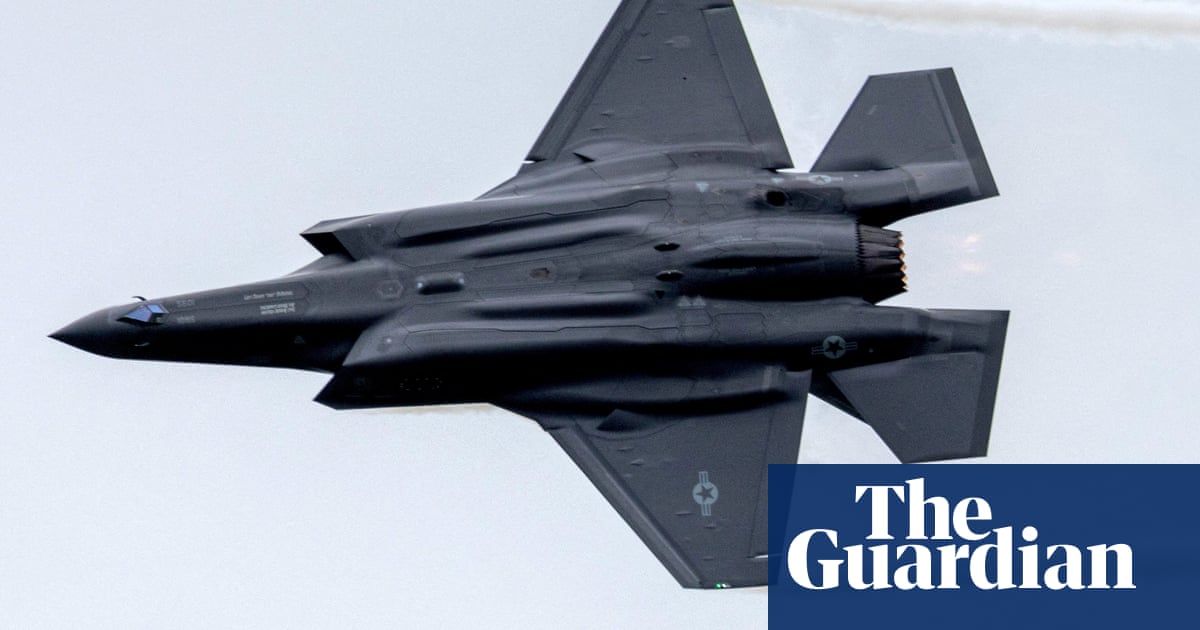Preserving the British role in the F-35 jet fighter programme takes precedence over the need to comply with UK laws on arms export controls, or any UK obligation to prevent a genocide in Israel, UK government lawyers will argue in court this week.
The long-awaited high court case will test whether ministers have broken the law by continuing to supply parts for the F-35 programme that may be used by Israel to attack Palestinians in Gaza. The four-day case starts on Tuesday and has taken nearly a year to come to court.
It has been brought by Palestinian human rights group Al-Haq but is supported bya raft of British human rights groupsincluding Amnesty, Human Rights Watch, Oxfam and the Global Legal Action Network (Glan).
The court action has already had impact; in September last year, the UK suspended some arms export licences 90 minutes before it was due to appear in court to defend the continued arms export licences to Israel.
In making the announcement in September suspending 30 arms export licences, ministers gave a carve out for the supply of UK components to the global pool of F-35 jets, saying such disruption to the entire F-35 programme would be a threat to Nato’s peace and security.
In papers to the court, the UK has acknowledged that its supply of F-35 components for potential use in Israel is in breach of its own arms export control laws. The laws state that arms export licences must not be granted “if there is a clear risk those items might be used to commit or facilitate a serious violation of international humanitarian law by Israel”. The UK government’s lawyers say the maintenance of the global F-35 supply chain is of paramount importance and parts are not being supplied directly to Israel.
Britain supplies 15% of the value of the F-35 jet, including ejector seats, rear fuselage, active interceptor systems, targeting lasers and weapon release cables, mainly through British Aerospace. The UK is the second largest supplier of spare parts for the jet after the US.
The UK insists it is not possible to set conditions on the use of these components, such as requiring Lockheed Martin to temporarily ban sales of F-35s to Israel.
Jennine Walker, a barrister representing Al-Haq, said it was absurd for the government to argue peace and security is a good reason for the government to depart from its own arms export policies.
She said: “Of course it is possible for the government to stop British made parts for F-35s being supplied to Israel without the whole global programme being affected, without any significant implications for international peace and security. What really undermines international peace and security is these flagrant violations of the law.”
Charlotte Andrews-Briscoe, a Glan lawyer representing Al-Haq, underlined the importance of the F-35s to the Israeli war effort, describing their impact as “catastrophic and continuing”.
She said Israeli pilots say they are working around the clock and non-stop, having undertaken 15,000 flight hours and 8,000 missions since 7 October, when thousands of Hamas-led gunmen attacked Israeli communities around the Gaza Strip, killing 1,200 people and abducting 251 hostages. In response, the Israeli campaign has killed more than 52,000 people and reduced much of the territory to ruins. “These war planes cause deaths and life-changing injuries. They also support ground troops that are intentionally starving an already decimated population.”
F-35s, she said, played a critical role, for instance on 18 March, when Israel broke the ceasefire with a wave of airstrikes that killed more than 400, according to the health ministry in Gaza. The dead included 183 children and 94 women, Palestinian officials said.
She also warned that the way the government had chosen to mount its legal case risked undermining the relevance of international law. She said: “The government has concluded the Geneva conventions have no domestic application unless and until an international court has ruled conclusively on the commission of genocide, which the government admit is likely to be years from now. If the court accepts these arguments it would completely gut the meaning of the duty to prevent genocide under international law”.
Sign up toFirst Edition
Our morning email breaks down the key stories of the day, telling you what’s happening and why it matters
after newsletter promotion
Yasmine Ahmed, director of Human Rights Watch, said the duty to prevent genocide is the beating heart of the genocide convention that came out of the ashes of the second world war.
She said it requires all convention signatories to take all reasonable steps at its disposal to prevent a genocide, adding that at the point Britain restricted arms exports licences on 2 September, but maintained them for the F-35s, the government did not even consider the risk of genocide.
In September, when permitting the continued supply of parts, ministers already knew 41,000 Palestinians had been killed in Gaza, including 15,000 children, and 1.9 million people had been displaced, the vast majority forcibly, while 60% of the residential property had been destroyed.
In a submission revealed at a preliminary hearing, the defence secretary, John Healey, said suspension would affect the “whole F-35 programme” and have a “profound impact on international peace and security”.
He added that it would “undermine US confidence in the UK and Nato at a critical juncture in our collective history and set back relations”, and could cause “adversaries” to “take advantage of any perceived weakness”.
Parts of the minister’s evidence on behalf the defence ministry was provided in public, but defence ministry officials have claimed any decision to restrict supply of F-35 parts is a matter for the F-35 executive steering board, a body that only acts by consensus. It added more than 1,000 F-35s currently operate with a high proportion undertaking either UK or Nato operations.
Making such judgments about national security, the government has argued, is primarily to be a matter for the executive.
